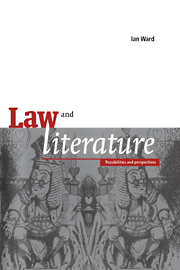2 - The text, the author and the use of literature in legal studies
Published online by Cambridge University Press: 29 September 2009
Summary
In 1968 the French semiotician Roland Barthes suggested that ‘writing … by refusing to assign to the text (and to the worldas-text) a secret i.e., an ultimate meaning, liberates an activity we may call countertheological, properly revolutionary, for to refuse to halt meaning is finally to refuse God and his hypostases, reason, science, the law’. In Barthes's opinion, the concept of law, along with reason, science and God, in its peculiar claim to objective interpretive meaning, represented a threat to the text, and to the reader. Barthes concluded his essay by suggesting that ‘the birth of the reader must be requited by the death of the author’. It has become fashionable in certain areas of literary theory to dismiss the role of the author in the reading of texts. Here I want to assess the situation of the author in contemporary literary theory, and to suggest that in law and literature scholarship there is perhaps a case for reintroducing the author, if not in the interpretive enterprise at least in the pragmatics of text use. The reader may, as Barthes would suggest, control the interpretation, but the author retains control, at least in part, of the use of a text.
- Type
- Chapter
- Information
- Law and LiteraturePossibilities and Perspectives, pp. 28 - 42Publisher: Cambridge University PressPrint publication year: 1995



